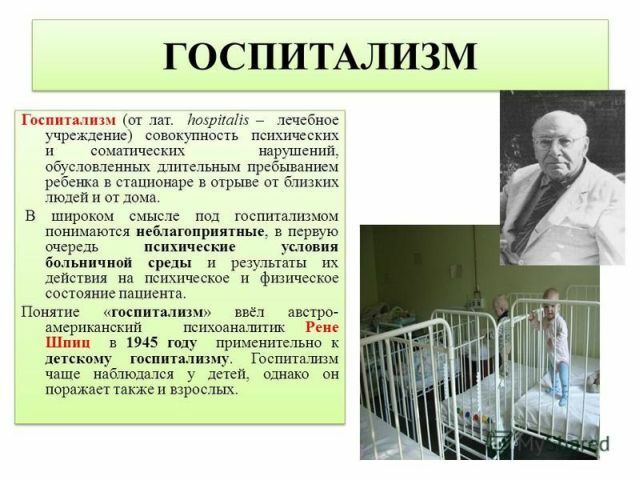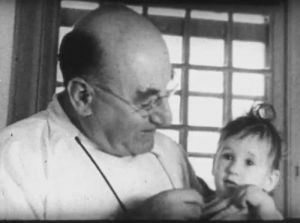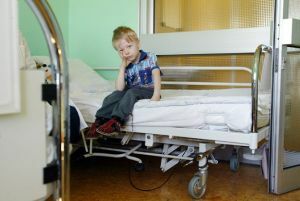 Among the disorders of mental and physical nature is a special place is hospitalism. This phenomenon implies a disorder that arises from a lack of communication and a lack of education( typical for children), as well as with prolonged stay of an adult person away from loved ones in a hospital hospital.
Among the disorders of mental and physical nature is a special place is hospitalism. This phenomenon implies a disorder that arises from a lack of communication and a lack of education( typical for children), as well as with prolonged stay of an adult person away from loved ones in a hospital hospital.
Prolonged psychological oppression can lead to death of a person.
Contents
- Essence of deviation
- Ideal conditions for degradation
- Basic ideas of the Spits theory and modern view
- The phenomenon of hospitalism in infancy
- Child deprivation
- How does it look in adulthood?
- The phenomenon of hospitalization in psychiatry
- How to operate
- Prevention of the occurrence of
syndrome The essence of the deviation
The phenomenon of hospitalization presupposes the presence of a number of mental and physical disorders that occur in children and adults for various reasons. In the first case, the deviation is due to a lack of communication, attention and education, in infants - separation from the mother.
The syndrome of hospitalism in children is expressed in mental and physical malorazvitosti and often leads to irreversible consequences, and in the absence of treatment - to death.
In adults, the disorder develops with prolonged stay in the hospital, in conditions of a lack of communication and is manifested in evasion from the existence in society, loss of interest in work and activity, loss of work skills, interest in staying in a hospital as long as possible. The longer the patient's stay in the hospital, the less likely it is to be kept as a unit of the social environment.

Ideal conditions for the degradation of
Hospitalism in children and adults occurs for the following reasons:
- Long-term hospitalization of , the conditions of which isolate a person from communicating with relatives and friends, while the circle of communication is limited to medical personnel. The risk factor in this case is chronic diseases, requiring frequent passage of long medical courses in a hospital.
- Separation of the child with the mother .
- Lack of attention from the mother and close to the small child , disinterest in him, his life and becoming his personality.
- Age of the .In infancy and childhood, children who are brought up in shelters, boarding schools and other places of this nature do not receive the necessary attention and care. This makes social adaptation difficult. Elderly age also contributes to the development of hospitalism, especially if the elderly are in specialized institutions - nursing homes, boarding schools. Lack of attention and lack of love can not but affect the psycho-emotional state of a person in years.
- Long stay of both children and adults, in the health centers , where the situation and the daily routine are similar to the conditions of the hospital.
Factors provoking the development of the syndrome, also include the poverty of the psychological environment, lack of emotional contact.
Basic ideas of the Spits theory and the modern view of
The American psychologist Renee Spits( Spitz), studying the behavioral peculiarities of boarding-school institutions, explained the phenomenon of hospitalism as follows: even in a favorable sanitary and hygienic setting, under conditions of satisfactory nutrition and care in children deprived of opportunitycommunicate with parents, there is a lag in development - a slowdown in the development of thinking and speech.
Earlier, the psychologist believed that an important condition for the development of the syndrome of hospitalism is the lack of vitamins in the diet and the small number of personnel called to provide care for children.

Renee Spitz
Followers of Spitz, further studying the phenomenon, somewhat expanded the notion of the term "hospitalism".From the point of view of modern researchers, such a syndrome arises not only when the child is separated from the mother, but also when close people, being close to the child, do not show interest in him and do not take part in the process of his development, becoming.
Hospitalism is especially dangerous for children, as it significantly hampers their development. Some mental and physical abnormalities may persist for life.
The phenomenon of hospitalization in infancy
In infancy, the general condition of children abandoned by their mothers, or suffering from a lack of care and attention, is characterized by the following indicators:
- refusal to eat, rapid weight loss;
- the child is constantly in a sleepy state, does not show any signs of activity;
- muscles are deprived of tonus, limbs are limp and lethargic;
- there is no feedback on the contacts.
Babies with such a syndrome later begin to hold their heads, crawl, sit and walk alone. Their movements are less coordinated, unstable and insecure.
Pediatric deprivation
 In children, in response to separation from the mother or in the absence of attention and love, hospitalism develops, which manifests itself in deep mental retardation, shortage of body weight and growth, and deviations in mental development.
In children, in response to separation from the mother or in the absence of attention and love, hospitalism develops, which manifests itself in deep mental retardation, shortage of body weight and growth, and deviations in mental development.
Infants do not react to the sound or movement of an object, for a long time they cry without reason. Older children deliberately beat their heads against the wall, late master the skills of neatness - usually only after 3-5 years.
They often have urinary incontinence - both night and day, calming. Sleep in these children is superficial. They do not have enough positive emotions, they refuse contacts, do not reach out to people. The process of formation of personality in them is broken.
All these phenomena lead to severe mental disorders, for example, - to autism, mental retardation.
How does it look in adulthood?
In adults, this syndrome usually occurs in old age, especially if the person is lonely and lacks the care, attention and love of close people.
Characteristic symptoms in this case are:
- loss of appetite;
- development of apathy;
- personal regression;
- memory degradation;
- loss of the ability to adequately think and be aware of what is happening;
- emotional impoverishment;
- decreased sociability;
- deterioration of relations with surrounding people;
- loss of interest in working life.
In adults, such a phenomenon can cause personal devastation, loss of interest in life.
The phenomenon of hospitalization in psychiatry
Separately, it should be noted that the conditions of stay in a psychiatric hospital create the risk of pharmacogenic regression of the personality that the  is the hardest form of hospitalism.
is the hardest form of hospitalism.
This phenomenon develops very quickly, with the situation aggravated by the fact that patients in a short time get used to psychotropic drugs. Such people lose the desire to learn or work, to exist altogether outside of hospital life.
After lowering the dosage of psychotropic drugs, the patient partially restores interest in the environment.
How to act
Treatment of hospitalism in children and adults is different. For children, this syndrome is especially dangerous, so the therapy takes much longer than with the restoration of adults.
To return the child to the social environment and return his interest in life, you need:
- work with a psychologist;
- pedagogical correction;
- extension of the circle of communication;
- intensification of the child's communication with peers.
 If the syndrome occurs when the child is placed in a hospital, it is necessary to return him to the family as soon as possible, and while he is in the hospital, regularly visit him and show interest in him, the best option is to arrange a 24-hour mother'swith baby.
If the syndrome occurs when the child is placed in a hospital, it is necessary to return him to the family as soon as possible, and while he is in the hospital, regularly visit him and show interest in him, the best option is to arrange a 24-hour mother'swith baby.
In the treatment of adult patients, the problem is affected as follows:
- , if possible, eliminates the symptoms of the disease, which causes the patient to be hospitalized, and its underlying cause;
- conducts rehabilitation with a psychotherapist;
- provide the patient with attention and care from relatives.
Prevention of the occurrence of
syndrome The prevention of a dangerous syndrome of hospitalism in children is to fill the child's day with interesting activities, play, perhaps - work. If possible, it is necessary to ensure sufficient attention and care from relatives, to talk with the baby, to discuss everything that interests him.
In adult patients, it is possible to prevent the development of this phenomenon by providing them with a circle of communication, allowing the placement of pictures of native people or objects reminiscent of a house in the ward.
It is necessary to keep the patient's social activity - if the condition allows, to involve him in simple care for the care of other patients, to ensure independence and independence in meeting the needs.



